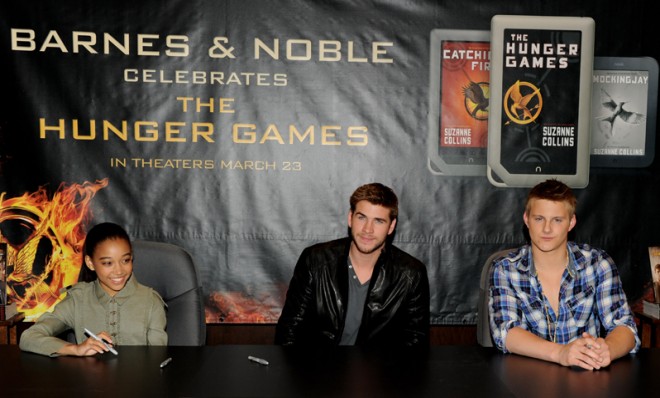Why Barnes & Noble is desperate for another Hunger Games
Life just isn't the same for the bookseller without a new installation in the blockbuster series

A free daily email with the biggest news stories of the day – and the best features from TheWeek.com
You are now subscribed
Your newsletter sign-up was successful
Barnes & Noble's latest earnings report was even worse than Wall Street feared.
This week, the book chain said the most recent quarter's losses more than doubled to $87 million, or $1.56 a share, from $39.8 million, or 76 cents a share, in the same quarter last year.
The company's shares slid more than 12 percent after the announcement to touch a six-month low.
The Week
Escape your echo chamber. Get the facts behind the news, plus analysis from multiple perspectives.

Sign up for The Week's Free Newsletters
From our morning news briefing to a weekly Good News Newsletter, get the best of The Week delivered directly to your inbox.
From our morning news briefing to a weekly Good News Newsletter, get the best of The Week delivered directly to your inbox.
Sales have been dropping for years for the retailer, as online goliath Amazon gobbles up the market with low prices and free delivery. But this quarter was especially tough. Sales in the Nook division fell 20 percent, to $153 million; the retail division brought in $1 billion, a 10 percent drop; and overall revenue dipped 8.5 percent, to $1.33 billion.
One reason this quarter was extra-painful: A drought in mega-hits.
The blame goes to "Suzanne Collins, who hasn’t written a single installation of The Hunger Games this year, and E.L. James, who has stopped writing Fifty Shades of Grey books without any concern for the impact it would have on the bookseller," says Joshua Brustein at Bloomberg Businessweek. Indeed, the company attributed about half the drop in retail sales to the void left after customers stopped buying titles from those two series en masse.
For some context: James alone made $95 million last year, a one-woman industry that B&N can only envy.
A free daily email with the biggest news stories of the day – and the best features from TheWeek.com
Barnes & Noble wasn't the only one hit by a drop in sales for The Hunger Games. Earlier this year, the book's publisher, Scholastic, lowered its expectations for the year, telling The Wall Street Journal, "[T]hird quarter sales of 'The Hunger Games' trilogy were significantly lower than our expectations, particularly in the U.S., Canada and Australia."
For now, the struggling bookseller is still investing in the Nook, which has been the subject of much buyout speculation. Founder and Chairman Leonard Riggio says his main priority is serving the company's 10 million Nook customers and bumping up sales of Nook products. Even though hardware sales have been limp, sales for content on the Nook actually beat estimates.
Still, it's easy to see how another mega-hit could feel like a life raft for the bookseller. Which, in turn, shows just how desperate Barnes & Noble's business model has become.
Carmel Lobello is the business editor at TheWeek.com. Previously, she was an editor at DeathandTaxesMag.com.
-
 Gisèle Pelicot’s ‘extraordinarily courageous’ memoir is a ‘compelling’ read
Gisèle Pelicot’s ‘extraordinarily courageous’ memoir is a ‘compelling’ readIn the Spotlight A Hymn to Life is a ‘riveting’ account of Pelicot’s ordeal and a ‘rousing feminist manifesto’
-
 The EU’s war on fast fashion
The EU’s war on fast fashionIn the Spotlight Bloc launches investigation into Shein over sale of weapons and ‘childlike’ sex dolls, alongside efforts to tax e-commerce giants and combat textile waste
-
 How to Get to Heaven from Belfast: a ‘highly entertaining ride’
How to Get to Heaven from Belfast: a ‘highly entertaining ride’The Week Recommends Mystery-comedy from the creator of Derry Girls should be ‘your new binge-watch’